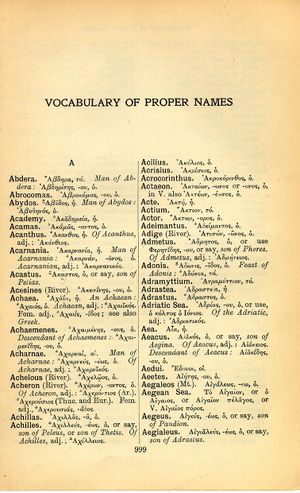Adrastea: Difference between revisions
ἀλλ' ἦν ἅπαντα τεταγμένα νόμων ἐπιταγαῖς → but all their acts were regulated by prescriptions set forth in laws
(3_1) |
m (Text replacement - "}}]]" to "}}]]") |
||
| Line 1: | Line 1: | ||
{{WoodhouseENELnames | {{WoodhouseENELnames | ||
|Text=[[File:woodhouse_999.jpg|thumb | |Text=[[File:woodhouse_999.jpg|thumb | ||
|link={{filepath:woodhouse_999.jpg | |link={{filepath:woodhouse_999.jpg}}]]Ἀδραστεία, ἡ. | ||
}} | }} | ||
{{Lewis | {{Lewis | ||
Revision as of 10:08, 15 August 2017
English > Greek (Woodhouse)
Ἀδραστεία, ἡ.
Latin > English (Lewis & Short)
Ā̆drastēa: or Ā̆drastīa, ae, f., = Ἀδράστεια.
I The daughter of Jupiter and Necessity (so called from an altar erected to her by Adrastus), the goddess who rewards men for their deeds, and who esp. punishes pride and arrogance: quod nec sinit Adrastea, Verg. Cir. 239: ineffugibilis, App. de Mund. p. 75; Amm. 14, 11.—
II A city of Mysia, later called Parium, Plin. 5, 32, 40, § 141; Just. 11, 6, 10.
Latin > French (Gaffiot 2016)
Adrastēa (-tīa), æ, f. (Ἀδράστεια), surnom de Némésis : Amm. 14, 11, 25 ; 22, 3, 12.
Latin > German (Georges)
Adrastēa (od. -īa), ae, f. (Ἀδράστεια), die Unentfliehbare, Unentrinnbare, Beiname der Nemesis (s. Nemesis), Amm. 14, 11, 25; 22, 3, 12. Apul. de mundo 38. Ps. Verg. Cir. 239.

